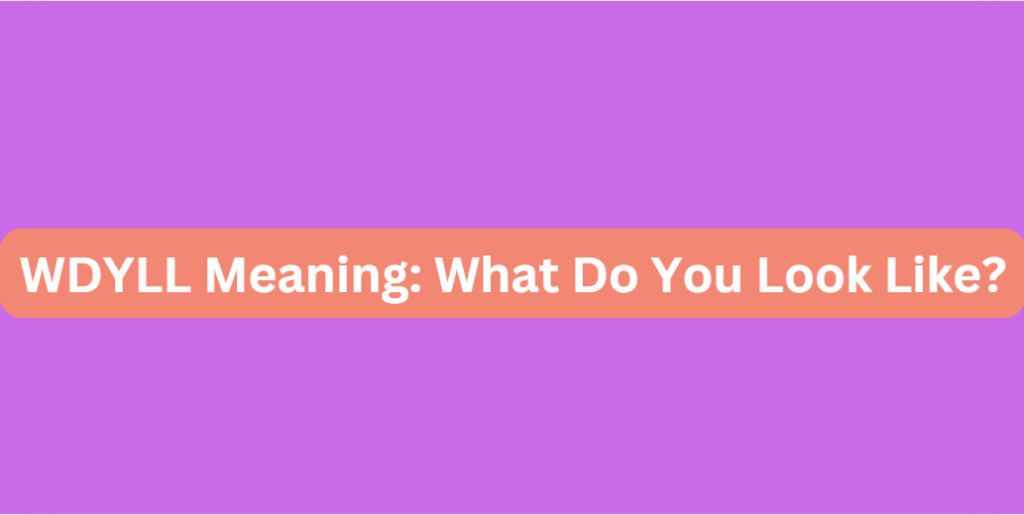Contents
Introduction
In the fast-paced world of the internet, where communication often needs to be quick and efficient, acronyms have become an integral part of online conversations. One such acronym that has gained popularity is “WDYLL,” which stands for “What Do You Look Like.”
While it may seem like a simple question, the implications and usage of “WDYLL” extend far beyond its literal meaning. In this comprehensive article, we will explore the origins, evolution, and cultural significance of “WDYLL,” offering insights that go beyond existing information and ensuring the content is optimized for the keyword “WDYLL meaning.”
The Origins of WDYLL
Early Internet and Social Media Days
The internet has always been a breeding ground for new forms of communication. From the early days of chat rooms and forums to the rise of social media platforms, users have developed shorthand phrases to streamline their interactions. “WDYLL” is one such acronym that emerged during the early 2000s, a time when social media was beginning to take shape.
During this period, platforms like MySpace, LiveJournal, and early versions of Facebook were gaining popularity. These platforms allowed users to connect with others, but they often lacked the multimedia features we take for granted today.
As a result, users would frequently ask each other “What Do You Look Like?” when no images were available on a profile. This phrase was quickly shortened to “WDYLL” to save time and effort.
The Rise of Acronyms in Online Communication
The use of acronyms in online communication isn’t new. In fact, acronyms have been around for decades, with some even predating the internet. However, the rise of digital communication platforms, such as email, instant messaging, and social media, accelerated their usage.
Acronyms like “LOL” (Laugh Out Loud), “BRB” (Be Right Back), and “IDK” (I Don’t Know) became common parlance, making communication quicker and more efficient. “WDYLL” followed this trend, becoming a useful tool for online interactions, especially in the context of building personal connections.
The Cultural Impact of WDYLL
While “WDYLL” started as a simple inquiry, it has grown to symbolize more than just a curiosity about someone’s appearance. In many ways, it reflects the evolving nature of online relationships and the desire for authenticity in a digital world. Understanding the meaning of “WDYLL” and its cultural impact requires a closer examination of how it is used in different contexts.
WDYLL in Modern Online Culture
The Evolution of WDYLL
As social media platforms have evolved, so too has the use of “WDYLL.” With the advent of platforms like Instagram, Snapchat, and TikTok, where visual content is central to user interactions, the need to ask someone what they look like may seem less relevant. However, “WDYLL” has not disappeared. Instead, it has taken on new meanings and uses.
In contemporary online culture, “WDYLL” is often used in more private or niche communities, where users may not have public-facing profiles with images. For instance, on platforms like Reddit or Discord, where anonymity is common, “WDYLL” might be used to prompt users to share a photo of themselves, particularly in threads or conversations focused on self-expression, identity, or social interaction.
The Role of WDYLL in Online Dating
The online dating scene has also seen its fair share of “WDYLL” usage. While most dating apps now require users to upload photos, the question of “What Do You Look Like?” can still arise, particularly in conversations that begin on text-based platforms or when users are hesitant to share images publicly. “WDYLL” becomes a way to break the ice or move a conversation to a more personal level.
WDYLL as a Tool for Building Connections
Beyond dating, “WDYLL” is used in online communities to foster connections and build trust. In gaming communities, for example, where players often spend hours interacting with each other without ever seeing one another, “WDYLL” might be asked out of curiosity or as a way to bring the virtual relationship closer to reality.
Similarly, in support groups or forums focused on personal development, members might use “WDYLL” to humanize their interactions and create a sense of camaraderie.
Analyzing the Impact of WDYLL
Privacy and Online Identity
While “WDYLL” can be a harmless question, it also raises important issues related to privacy and online identity. In an age where personal data is valuable and often exploited, some users may be reluctant to share their appearance online. This hesitation is particularly relevant in communities where anonymity is prized, such as certain Reddit threads or forums dedicated to sensitive topics.
The question of “What Do You Look Like?” can also intersect with issues of self-esteem and body image. For some, sharing a photo might feel like a risk, especially in environments where appearance can lead to judgment or criticism. As a result, “WDYLL” can sometimes be seen as intrusive, and users might choose to ignore or deflect the question.
The Changing Nature of Online Communication
The way we communicate online is constantly evolving, and “WDYLL” is a reflection of that change. As the internet continues to shift towards visual content, with platforms like Instagram and TikTok dominating the social media landscape, text-based questions like “WDYLL” may seem less relevant. However, the acronym persists, particularly in spaces where text is still the primary mode of interaction.
WDYLL and the Desire for Authenticity
In a world where social media often presents a curated version of reality, “WDYLL” can be seen as a quest for authenticity. By asking someone what they look like, users are attempting to bridge the gap between the online persona and the real person. This desire for authenticity is a common theme in online interactions, where the lines between the digital and physical worlds are increasingly blurred.
The Psychology Behind WDYLL
Curiosity and Human Connection
At its core, “WDYLL” is driven by human curiosity and the desire for connection. As social creatures, we are naturally inclined to want to know more about the people we interact with, including what they look like. This curiosity is amplified in online spaces, where visual cues are often absent, and users must rely on text to convey their identities.
The Role of Visual Identity in Online Relationships
Visual identity plays a significant role in how we perceive and relate to others. In face-to-face interactions, appearance is one of the first things we notice, and it can influence our judgments and decisions. Online, where these visual cues are often missing, the question of “What Do You Look Like?” becomes a way to fill in the gaps and build a more complete picture of the person behind the screen.
The Impact of WDYLL on Self-Perception
For those being asked “WDYLL,” the question can have a profound impact on self-perception. On one hand, sharing a photo can be empowering, allowing individuals to present themselves as they choose.
On the other hand, it can also lead to feelings of vulnerability, especially if the response to the image is not as positive as expected. Understanding the psychology behind “WDYLL” helps to explain why some users might embrace the question, while others might shy away from it.
The Role of WDYLL in Different Online Platforms
Reddit and WDYLL
Reddit, a platform known for its diverse range of communities (or subreddits), is one of the places where “WDYLL” is commonly used. On Reddit, users often maintain a degree of anonymity, with many choosing not to share personal information, including photos.
In subreddits focused on personal experiences, such as r/AskReddit or r/relationship_advice, “WDYLL” might be asked to get a better sense of the person behind the story. However, it’s important to note that Reddit’s culture values privacy, and not all users may feel comfortable responding to the question.
Discord and WDYLL
Discord, a platform primarily used for group communication, especially in gaming communities, also sees the use of “WDYLL.” In text-based channels, where users interact through chat rather than video, “WDYLL” might be asked out of curiosity or as a way to bring the group closer together. In some cases, users might share images in a dedicated channel, while in others, they might prefer to keep their appearance private.
Online Dating Apps and WDYLL
As mentioned earlier, online dating apps are another space where “WDYLL” is relevant. Even though most apps require photos, the question might come up in conversations that begin on text-based platforms like WhatsApp or Messenger before moving to a dating app. In these cases, “WDYLL” serves as a way to establish physical attraction and move the relationship to the next level.
Instagram and WDYLL
On a platform like Instagram, where visual content is king, the question “WDYLL” might seem redundant. However, it can still come into play in private messages or in cases where users have not posted recent photos. Additionally, “WDYLL” might be asked when someone is curious about a user’s appearance outside of the carefully curated images they share on their profile.
How to Use WDYLL Responsibly
Respecting Privacy
When asking someone “WDYLL,” it’s important to respect their privacy. Not everyone is comfortable sharing their appearance online, and it’s crucial to be understanding if someone declines to answer the question. Pushing for a response or making someone feel uncomfortable is not only disrespectful but can also harm the relationship.
Considering the Context
Before asking “WDYLL,” consider the context of the conversation. Is it appropriate to ask about someone’s appearance in this particular setting? In some cases, the question might be seen as intrusive, especially if the conversation has not reached a personal level. Make sure that the question aligns with the tone and purpose of the interaction.
Being Mindful of Self-Esteem
Asking “WDYLL” can have an impact on someone’s self-esteem, particularly if they are self-conscious about their appearance. If someone shares a photo in response to “WDYLL,” it’s important to be supportive and positive in your reaction. Negative comments or criticism can have lasting effects and should be avoided.
FAQs about WDYLL Meaning
What does WDYLL stand for?
WDYLL stands for “What Do You Look Like.” It is often used in online conversations to ask someone about their appearance.
Where is WDYLL commonly used?
WDYLL is commonly used on platforms like Reddit, Discord, and in online dating conversations. It can also appear in private messages on social media platforms like Instagram.
Is it appropriate to ask someone WDYLL?
Whether it’s appropriate to ask “WDYLL” depends on the context of the conversation and the relationship between the individuals involved. It’s important to be respectful and consider the other person’s comfort level before asking.
How should I respond if someone asks me WDYLL?
If someone asks you “WDYLL,” you can choose to share a photo if you’re comfortable, or you can politely decline if you’d prefer to keep your appearance private. It’s entirely up to you how you respond.
Why do people ask WDYLL?
People ask “WDYLL” out of curiosity and a desire to connect with the person they are interacting with. It can also be a way to build trust and bring an online relationship closer to reality.
Conclusion
The meaning of “WDYLL” extends far beyond its simple acronym. It reflects the evolving nature of online communication, the desire for authenticity, and the complex psychology behind how we perceive and present ourselves in digital spaces.
While it may seem like a straightforward question, “WDYLL” carries with it a range of cultural, social, and psychological implications. By understanding these nuances, we can use “WDYLL” responsibly and thoughtfully in our online interactions, fostering connections that are both meaningful and respectful.
As we continue to navigate the ever-changing landscape of the internet, the meaning and usage of “WDYLL” will likely continue to evolve. Whether you’re a frequent user of online communities or someone new to digital communication, understanding the significance of “WDYLL” can help you engage more effectively and empathetically in the online world.



